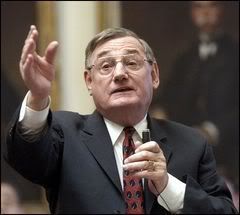Some of you may remember several weeks ago there was an article written by
Washington Post columnist William Arken, chastising American soldiers for asking the American people to support President Bush and
the men and women who are fighting the Iraq war. Well, his comments didn’t sit well with military men and women of America, or some of the American people and a firestorm erupted.
I posted a response to Arken's letter on the Washington Post’s site and also to this site
which you can find here. This prompted some interesting responses directed at me. Of the many responses (over 30 of them, by this time) only three letters were from moonbats who were outraged at my outrage. One was a slab of anti-Bush obscenities not worth repeating. Another expressed his pity for me, and the last was the most interesting one.
The last letter was a two-pager in questionnaire form designed to convince me that the “American people” are the Commander in Chief, not President Bush. I have removed the individuals name and vital info. The value of the letter is that it shows just what type of ideas and mentality with respect to the military are ticking inside the head of those who would support Arken's position. He asked me for my comments, which I will post here later this evening.
******
Dear Mr. Pope,
I am not William Arkin, and so you haven't invited me to discuss your thoughts that you shared on the second of February; nevertheless, I was wondering if I might ask you a few questions. (I am not an employee of the Washington Post, nor, for that matter, any media organization. I'm a programmer in the private sector who just happened to read your statement.)So that we're sure we're on the same page, to the column entitled "The Troops Also Need to Support the American People" you responded at 8:33 AM EST with a reply that began:"Dear Mr. Arken;I'm almost not sure what to write, as what I would really like to say is 1.) not (or should not be) printable, and 2.) would be below the decorum of a former soldier who served this great country in Gulf War I, and is now grateful that he did...."I noticed (with some dismay) your final paragraph:
"Soldiers do have a paycheck, healthcare at military hospitals (not all hospital visits and treatments are free by the way.) But these things are not things that require them to cow-tow to public opinion. They are benefits earned by people who do the most important job in this country; protecting us from all enemies foreign and domestic. Thanks for giving the United States a look at what liberal socialists really want in exchange for all the free healthcare, food stamps, and all the other "freebies" the government gives. You are thereby a bought-and-paid-for slave of the ruling class of government utopia, and in exchange they will tell YOU what to think. Anything outside of this earns you a slap from King Arken on his throne at the Washington Post. Long live the dictator." [Emphasis added.]I had a few questions, and perhaps a few comments that I'd be interested in hearing your thoughts on.
1) Washington DC is a city of around 600,000 people. There are perhaps 700-800 "politicians" (President, his direct staff, the various Senators and Representatives, Secretaries and Under- Secretaries of the various departments) and perhaps 4,000-5,000 people who could be said to work in the political "industry" (and this includes the more political think-tanks, lobbyists, political staffs of congressmen as well as party-affliated organizations).Even if my estimates are off and you double the total politically involved population, at least 95% of the city (and thus 99.75% of the 4 million or so in the "Washington DC Metropolitan Area") are not political as such. They are programmers and soldiers, bureaucrats (delivering your pension) and NIH research scientists (finding cures for diseases so your children and mine have a better life). They are, for lack of a better phrase, "real people".Do you really think DC is "un-American", full of people who are not "real", etc? On what basis do you make that claim (and frankly, why do you feel that you have the right to say another American citizen is less "American" than you, much less 4 million other citizens)?
2) Who do the soldiers in the US armed forces work for? I am not asking on whose behalf do they labor, but rather who is their ultimate master, their highest superior? The President may be the highest operational manager, the Congress may be the paymasters, but the armed forces work for the citizenry, and so isn't it the latter's right to comment in any way they see fit on the people they've hired to do their bidding? Military service may entail risk, but that risk isn't different in kind than working on an oil rig or in the construction of a skyscraper, is it? (It may differ in the quantity of risk, but all three are occupations that involve the realistic possibility of bodily harm or death)
3) Given that, in a sense, the Armed Forces are my employees (and yours, and my neighbor's, etc), doesn't their behavior reflect on me far more directly than that of a poorly organised mob in Iraq? Whether or not some insurgents cut off heads, don't I have a responsibility (to say nothing of my right) to judge how my employees conduct themselves?
4) I grant completely that our military isn't paid well enough. I feel the same way about the civil service, although certainly the degree to which the military is underpaid may be higher. I do feel that we could stand to reduce our military procurement budget (by sharing development costs with close allies for example) and some of those savings should certainly be passed on to direct wage increases, as well as paying for better (and more) training.
5) "Soldiers do have a paycheck, healthcare at military hospitals (not all hospital visits and treatments are free by the way.) But these things are not things that require them to cow-tow to public opinion." Given that the public represents the highest political authority, and that the Armed Forces are constituted under an organisation "owned" by the public, don't our troops _owe_ the public their loyalty, respect, and regard? Our troops have a right to their own views, of course, but to the extent that it is often held to be inappropriate within the military to criticise the President, don't you find it odd that so many soldiers are willing to condemn the American public?
6) Opposing the war is not a minority view now; you do realise this, don't you? It seems odd to condemn Mr. Arkin as a dictator for having views on the military that are, at least in broad strokes, in agreement with most Americans. It is also a bit strange to single out those citizens who feel that a greater governmental role in lifting up the less fortunate may be warranted as a "ruling class" out to tell others "what to think". I have no doubt you say this because you incorrectly assume that every liberal is an anti-war activist and that all liberals hate the military.
7) Do you really think the military serves the most vital need our population has today? We have no credible military threats; those with armies large enough, and developed enough to harm us are either our allies (Europe, whatever you might think, is very cooperative with us in every sphere other than Iraq. Half of the troops in Afghanistan are from the militaries of EU member state.) or have insufficient naval resources to transport troops to our shores even if we had no armed forces (China).Terrorism is a concern, but with greatest respect, our military is useless against it. The FBI and the CIA are the appropriate entities to defend us against _those_ threats, and evidence of this can be seen in the recent thwarting of airline-based attacks in London. It was their law enforcement and intelligence agencies that detected and prevented those attacks, not their Army, Navy or Air Force. Our Armed Services cannot police our cities (and one of our oldest laws prohibits them from doing so, to boot). I am not condemning our military when I say that today's security threats are not in their job description.
8) The above reminds me, you aren't under the misapprehension that Iraq was connected to 9/11, are you? The 9/11 Commission (bipartisan and filled with national security experts) concluded that there was absolutely no link between the two, and between Iraq and Al Qaeda in general.
Well, if you choose to read this email, I look forward to reading your throughts on my comments.Have a good day.
[Signature info removed]





























